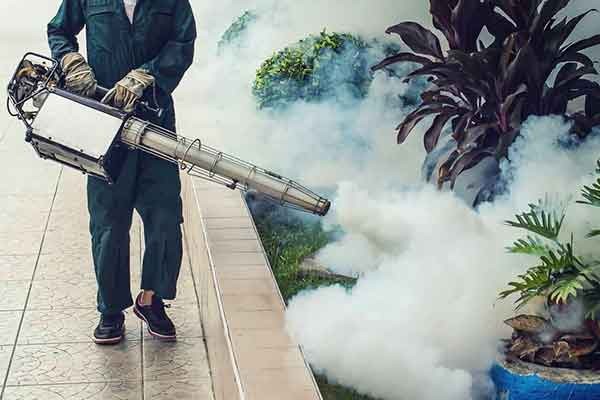
Fumigation Pest Control Services
Fumigation services involve the use of specialized chemicals, often in the form of gas or vapor, to eliminate pests, insects, rodents, or other unwanted organisms from a specific area.
This method is commonly used in agriculture, pest control, and sanitation to ensure the effective removal of pests or prevent the spread of diseases. Here are key aspects of fumigation services:
Pest Eradication: Fumigation is employed to eliminate a wide range of pests, including insects (such as termites, bedbugs, and roaches), rodents (like rats and mice), and plant pathogens (fungi, bacteria, and nematodes).
Agricultural Use: Fumigation is an important practice in agriculture to protect crops and stored grains from infestations. It can also be used to sterilize soil to eliminate pathogens before planting.
Structural Fumigation: In structural fumigation, a building or structure is enclosed and sealed, and fumigants are introduced to eliminate termites and other wood-destroying pests. This is a common method for long-term pest control in structures.
Commodity Fumigation: It is used for fumigating commodities such as grains, food products, and other goods stored in warehouses or shipping containers to prevent infestations during storage and transport.
Quarantine and Biosecurity: Fumigation plays a crucial role in enforcing quarantine regulations and biosecurity measures at ports and border checkpoints to prevent the spread of invasive species or diseases.
Preventative Measures: Some industries use fumigation as a preventative measure to ensure that their products or facilities remain pest-free. This is especially common in the food and pharmaceutical sectors.
Safety Protocols: Fumigation involves the use of chemicals that can be harmful to humans and the environment. As a result, strict safety protocols must be followed, including proper sealing of the fumigated area, signage, and the use of trained personnel wearing appropriate protective gear.
Regulatory Compliance: Fumigation services are subject to regulations and guidelines set by government agencies and environmental authorities. These regulations vary by location and the type of fumigant used.
Fumigants: Various chemicals are used as fumigants, including methyl bromide, phosphine, sulfuryl fluoride, and more. The choice of fumigant depends on the target pests, the nature of the treatment, and regulatory considerations.
Fumigation Contractors: Fumigation is typically carried out by trained and licensed professionals or companies specializing in pest control and fumigation services. These contractors have the expertise and equipment needed to safely administer fumigants.
Monitoring and Residue Testing: After fumigation, monitoring and residue testing are often conducted to ensure that the fumigants have dissipated and that the area is safe for re-entry.
Communication with Stakeholders: In some cases, neighbors, nearby businesses, and the general public may need to be informed about upcoming fumigation activities to ensure their safety and compliance with regulations.
Fumigation is a highly effective method for pest control and prevention, but it must be performed with great care and in accordance with legal and environmental standards to minimize risks to human health and the environment. It is important to work with experienced professionals when considering fumigation services.